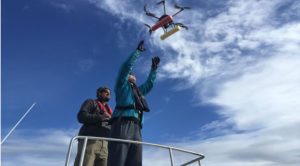
Law enforcement officials in the Pacific Northwest want drone users to stay away from endangered killer whales and researchers are not happy about it.
According to public radio station KUOW, the growing hullabaloo is focused on a murky state law requiring boats to stay away from orcas to within a distance of 200 feet. The regulations do not specifically mention aircraft and especially does not deal with drones.
And while wildlife officials and some whale advocacy groups hope the law will be expanded in order to stop what they see as a potential threat to whales, scientists say the ban would harm whales in the long run by prohibiting research that could help them. Both sides agree that current state laws need clarification and that amateur drone pilots should exercise caution around whales.
Last year, NOAA Fisheries researcher partnered with Vancouver Aquarium to deploy a hexacopter to within 100 feet of an endangered Southern Residents whale pod. The scientists wanted to know if the whales, which can be found off the coast of Seattle, were getting a steady diet of Chinook salmon – a species whose annual runs into the ocean are growing smaller.
“[Drone deployment] can give us a more sensitive measure that we might be able to respond to before whales die John Durban, a biologist with NOAA’s Southwest Fisheries Science Center in La Jolla, Calif.
A NOAA press release points out that the scientists obtained several government permits, including specific authorization under the Marine Mammal Protection Act. However, Washington Fish and Wildlife officers say they are tasked with enforcing state law and they, along with a local District Attorney, want some clarification on where drones fall within the 200-foot rule.
“Recent statements by the Federal Aviation Administration regarding regulation of drones cause us to question whether the application of [the state’s whale restriction] to the operation of aircraft (including drones) … is preempted by federal law regarding aviation,” stated San Juan County District Attorney Randall K. Gaylord in a request for opinion by the Washington Attorney General’s office.
Gaylord is referring to a ruling issued last year by the FAA warning that the federal agency retains sole “authority to regulate the areas of airspace use, management and efficiency, air traffic control, safety, navigational facilities, and aircraft noise at its source.”
For now, the status of Washington’s whale watching regulations will keep floating in murky waters.
For example, Washington wildlife police cited two drone users in 2015 under the law in question. However, one pilot contested the thousand-dollar ticket and it was later dismissed.
Jason is a longstanding contributor to DroneLife with an avid interest in all things tech. He focuses on anti-drone technologies and the public safety sector; police, fire, and search and rescue.
Beginning his career as a journalist in 1996, Jason has since written and edited thousands of engaging news articles, blog posts, press releases and online content.
Email Jason
TWITTER:@JasonPReagan
Subscribe to DroneLife here.